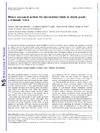Identificador persistente para citar o vincular este elemento:
https://accedacris.ulpgc.es/jspui/handle/10553/44743
| Título: | Dietary assessment methods for micronutrient intake in elderly people: a systematic review | Autores/as: | Ortiz-Andrellucchi, Adriana Sánchez-Villegas, Almudena Doreste-Alonso, Jorge Vries, Jeanne de Groot, Lisette de Serra-Majem, Lluís |
Clasificación UNESCO: | 3206 Ciencias de la nutrición | Palabras clave: | Elderly People Dietary Assessment Methods Systematic Review Validation Micronutrients |
Fecha de publicación: | 2009 | Publicación seriada: | British Journal of Nutrition | Resumen: | The European micronutrient recommendations aligned (EURRECA) Network of Excellence seeks to establish clear guidelines for assessing the validity of reported micronutrient intakes among vulnerable population groups. A systematic literature review identified studies validating the methodology used in elderly people for measuring usual dietary micronutrient intake. The quality of each validation study selected was assessed using a EURRECA-developed scoring system. The validation studies were categorised according to whether the reference method applied reflected short-term intake ( < 7 d), long-term intake ( > or = 7 d) or used biomarkers (BM). A correlation coefficient for each micronutrient was calculated from the mean of the correlation coefficients from each study weighted by the quality of the study. Thirty-three papers were selected, which included the validation of twenty-five different FFQ, six diet histories (DH), one 24-h recall (24HR) and a videotaped dietary assessment method. A total of five publications analysed BM, which were used to validate four FFQ, and one 24HR, presenting very good correlations only for vitamin E. The analysis of weighted correlation coefficients classified by FFQ or DH showed that most of the micronutrients had higher correlations when the DH was used as the dietary method. Comparing only FFQ results showed very good correlations for measuring short-term intakes of riboflavin and thiamin and long-term intakes of P and Mg. When frequency methods are used for assessing micronutrient intake, the inclusion of dietary supplements improves their reliability for most micronutrients. | URI: | https://accedacris.ulpgc.es/handle/10553/44743 | ISSN: | 0007-1145 | DOI: | 10.1017/S0007114509993175 | Fuente: | British Journal of Nutrition [ISSN 0007-1145], v. 102 (sup. 1), p. S118-S149, (Diciembre 2009) |
| Colección: | Artículos |
Citas SCOPUSTM
45
actualizado el 08-jun-2025
Citas de WEB OF SCIENCETM
Citations
39
actualizado el 18-ene-2026
Visitas 10
32
actualizado el 11-ene-2026
Descargas
29
actualizado el 11-ene-2026
Google ScholarTM
Verifica
Altmetric
Comparte
Exporta metadatos
Los elementos en ULPGC accedaCRIS están protegidos por derechos de autor con todos los derechos reservados, a menos que se indique lo contrario.
